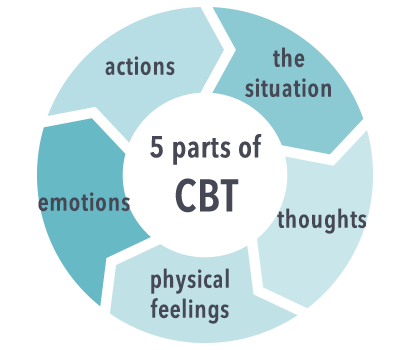The First step is learning more about Anxiety- Psychoeducation
The first and foremost step in overcoming a psychological issue is to learn more about it, also known as psychoeducation. Insights into your problem would assure you that you’re not alone, and you may even discover specific helpful strategies to overcome it. Some people find that knowing well about their problem is an essential and massive step on the road to recovery.
Today, we will discuss a disorder that is affecting 40 million adults in the U.S., Anxiety.
So, before diving deep into the read, let’s first understand "anxiety" well.
What is Anxiety?
Imagine you’re thirsty, and you don’t have any water bottle to meet your dehydration needs. The way thirst signifies your unmet requirements; similarly, anxiety also signals that you’re not meeting your needs. Not this doesn’t mean that your mind has no direct connection with your happiness; of course, there is. However, a peaceful mind is not just about responding to situations; it’s also about how we make sense of it.
Let’s put it technically-
Anxiety is the response of mind and body to stressful, harmful, or say unfamiliar situations. It’s a feeling of distress, uneasiness, or dread before you come across a significant event. Anxiety to a certain level helps stay alert, but the experience can be utterly debilitating for those suffering from an anxiety disorder.
Cognitive Behavioral Therapy for Anxiety Disorders
Millions face this problem, and as strenuous as it seems to tackle it, some solutions can ease your life. There is a popular therapy in town, and it’s not lying on the couch and talking to your mom (though it is quite relieving). It is termed as Cognitive Behavioral Therapy, abbreviated as CBT.
Cognitive Behavioral Therapy is based on the idea that our emotions, thoughts, and behaviors are intertwined. Equipped with strategies like questioning fearful thoughts, relaxing, and trying new activities, the therapy deals with various illnesses like depression, substance abuse disorders, schizophrenia, and others.
Here, in this read, we will discuss Cognitive Behavior Therapy for anxiety.
Intrigued? Scroll Down!!
Top 4 Instantly Calming CBT Techniques for Anxiety
1. Identify your thoughts

Often people feel that thoughts come before emotions, but it’s a false perception. Strong
Feelings give rise to the thinking traps, which, in turn, affects one’s behavior. So it is easier to transform your feelings than to change thoughts. CBT helps in coping with those challenging emotions.
When you sense anxiety, then try understanding what bores these anxious thoughts. For instance, “I feel awkward singing in school assemblies. Everyone would mock my voice.”
In a CBT session, you would be figuring out the root of this thought- the feeling which makes you so anxious. Perhaps, it’s a bad experience or merely an illusion of your mind. Whatever be it, understanding the troubling emotions will assist in the easy recovery.
2. Stand on Realistic Grounds
Thoughts shape reality, so know what you’re thinking. Most of us don’t pay attention to our thoughts and try to understand the validity of them. For instance, your friend has cancer, and you are feeling sad, which is quite normal. On the other hand, your colleague didn’t invite you for a party, and you may think that everyone hates you, this is a problematic thought and may not be entirely accurate.

CBT teaches you to check out the reality before deriving any conclusions. In this case, the reasons for your colleague not inviting you to the party can be anything like, he forgot to message you, or it was just a close family and friends gathering, etc.
3. Relax and Act Normally
Anxiety is a survival response and not a typical illness. At times, this response can head in a completely wrong direction and may hinder than help. Anxiety kicks in when it senses a threat, even though the perceived risk may not be real. In such situations, it is essential to train anxiety to be selective and let it fade.
CBT teaches you to act in certain ways that wouldn’t happen in a real emergency; this way, the anxiety would fade. For instance, during an emergency, you wouldn’t-
- Smile
- Breathe deeply
- Talk softly
- Listen to calm music
- Have an open body posture
Whenever we adopt such behaviors during anxious emotions, we send a message to ourselves, “listen, if it was a real threat, you wouldn’t be smiling, and taking deep breaths.”
4. Face your Fears
It is normal to avoid the situations you fear, as it reduces your anxiety for the short term. For instance, you faced bullying during your teenage years, and the feeling still holds a space in your heart. Now you get afraid of becoming part of any group or situation with several people in it and may at some point result in bullying. The fear is normal, and avoiding it for the short term is also acceptable, but framing your whole life based on that incident is wrong.
In CBT, an individual is taught to face his/her fears, which is also known as exposure. This step is very vital for managing your anxiety. In the above example, start with the situations that only cause you a little bit of anxiety. Introduce yourself to small groups, maybe the ones that are part of your family, because it's easier to adjust. Once you grow comfortable in familiar environments, make your way up to more advanced situations like public gatherings, groups full of strangers, etc. This step is more like a muscle; the more you practice, the faster your fears will fade.
Preventing Relapses
A relapse is a 360-degree turn to all of the old thinking and behaving patterns. When it’s normal to experience a brief relapsing period during times of stress or fatigue. To prevent relapse, you need to keep practicing your anxiety management skills.
Managing anxiety is more like an exercise- keep practicing your CBT skills to live a peaceful life. If you’re regularly practicing, you will always be ready to face whatever situations you’re faced with. Finally, it is essential to reward yourself for all the efforts you’re making. After all, anxiety management is neither easy nor fun, and it should be rewarded with a nice meal or shopping at your favorite site.
Peaceful Living!!!



